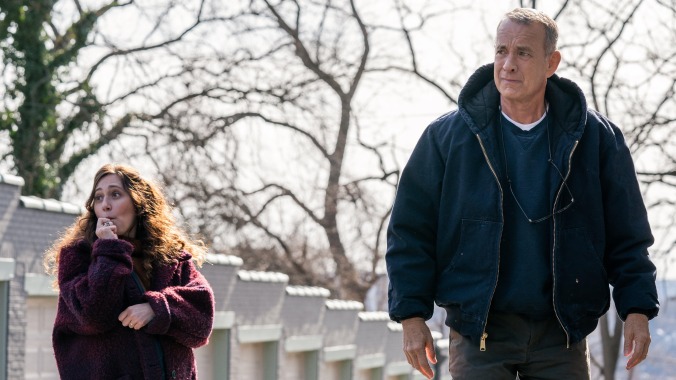A Man Called Otto review: Tom Hanks remakes Gran Torino as a sappy crowd-pleaser
Hanks isn't quite believable as a suicidal widower who finds redemption in Marc Forster's three-hankie comedic drama
Film Reviews Tom Hanks
There’s probably very little downside to being Tom Hanks. He’s rich, successful, preternaturally positive and everybody loves him. Those last two, however, make it hard to buy him as a character who yells at the paperboy, insults foreigners and is headstrong in his desire to commit suicide. But he’s all that, and more, in Marc Forster’s A Man Called Otto, an amiable film that finds a new and unconvincing way to reinforce Hanks’ gentle nobility. The weight of the two-time Oscar winner’s personae prevents us from thinking that a grumpy-looking Hanks is any more threatening than Grumpy, the Disney animated dwarf. Yes, Otto is a contentious grouch and recent widower whose list of grievances is as long as his temper is short. But soon he’ll be announcing his integrity as a friend to transgender people, the disabled, homeowners threatened with eviction and, of course, kids. With Hanks and Forster (Quantum Of Solace) working in a facile, crowd-pleasing register, A Man Called Otto is easy to settle into but hard to believe.
The film is a remake of Sweden’s two-time Oscar nominee, A Man Called Ove, where the title role is played by an actor (the terrific Rolf Lassgård) unknown to American audiences so they had no preconceived idea as to how the character might develop. Tom Hanks, by virtue of being Tom Hanks, eliminates that element of surprise so we’re stuck, at least at the outset, with America’s Dad spouting unpleasantries in tight close-up, as if this “in your face” character is invading our personal space. With a gruff voice and downturned mouth, Otto lords over the Pittsburgh-area housing block where he lives. He hassles residents and visitors about their lousy parallel parking skills, their refusal to close the main gate properly and their inability to use the correct trash bin for recyclables. Some residents consider him a “grumpy old bastard” and “a nasty, bitter old man,” characterizations Otto is too entombed in anger and misery to refute.
There’s nothing Otto can’t complain about, including the cost of the rope he needs to hang himself. But that’s how despondent he’s become. Hanks is an accomplished enough actor that a movie can certainly build to his character contemplating suicide, but our view of him is too reflexively warm and cozy for a movie to begin with such a notion. Plus, we know Otto will eventually be shaken from his spiritual stupor and the tragic story of his past will be revealed. So the question becomes how will this old-fashioned button pusher take us to the destination we see coming a mile away? The answer is the film’s best weapon. Otto’s savior, the one who’ll annoy, needle and harass him until he bares his soul, is his new neighbor, Marisol, played by the sparkling Mariana Treviño in a career-launching turn. A long-haired ball of hot-blooded positivity destined to melt Otto’s ice-encrusted heart, Marisol makes a great foil for her miserable neighbor, using her quick wit and energy to fulfill her narrative responsibility.
Otto’s story, one where tragedy is often accompanied by a treacly pop song or a cue from one of Thomas Newman’s lesser scores, takes the least challenging road to tearjerker city. That’s unfortunate coming from Forster, a versatile director who’s shown a deft emotional touch before, as in 2004’s affecting, Finding Neverland. Here, the story’s brush strokes are so broad that you may find yourself grabbing your hankie, but then who hasn’t teared up at a beautifully written greeting card? And he can’t give much legitimacy to flashbacks of a young Otto, played with very little screen presence by Hanks’ son, Truman, courting his soon-to-be wife, Sonya. Their relationship, which begins on a train and takes a melodramatic turn on a bus, is wholly unbelievable which makes Otto’s undying love for her an article of faith not effective storytelling.
With his old-school disdain for hybrid cars and cordless phones and his fist-shaking claim that the world is “trying to erase us,” A Man Called Otto often plays like a watered down and gutless version of Clint Eastwood’s Gran Torino. Except Eastwood’s films are often about people who buck the system whereas Hanks’ films often confirm the righteousness of those systems and (usually) the men who fight to keep them in place. It’s a question worth pondering whether Gran Torino’s Walt Kowalski would have come to embrace the social media journalist and the local transgender boy who roam Otto’s neighborhood. With Otto, the question is effectively answered before it’s even asked.
A Man Called Otto is on its firmest ground when Otto goes toe-to-toe with Marisol. The wonderful Treviño never cedes a scene to Hanks out of respect or fear. That she’s able to prop the film up on her formidable shoulders is even more remarkable considering that A Man Called Otto marks one of the least effective uses of Hanks’ talent. Either in a comedy or a drama, he’s just not ready to pretend he’s Grandpa Simpson. Nor is he someone who looks like he’d seriously throw himself in front of a train. Unlike Jack Nicholson or Bill Murray, whose smile can be either charming or sinister, Hanks always lets us know the character is headed towards redemption. A Man Called Otto would have been a more authentic emotional journey if he didn’t.